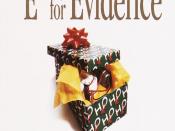After over 100 years the provisions of the Criminal Evidence Act 1898 relating to the cross examination of the accused are set to be fundamentally reconsidered. Three key reports have recommended such action. Lord Justice Auld in the Criminal Court Review, the Government in "The Way Ahead" policy paper and the Law Commission in their report Evidence of Bad Character in Criminal Proceedings have all outlined solutions to solve the problems that allow the current rules for cross examination of defendants under the Criminal Evidence Act 1898 to operate unfairly and distort the process. Although most agree that reform is necessary how this should be done has proved a more difficult question to answer.
Broadly speaking the Criminal Evidence Act 1898, sections 1(2) and 1(3) state that an accused cannot be cross-examined on his or her previous misconduct. The main reasons advanced for the rule are that such evidence is generally irrelevant and that, in any event, its prejudicial effect is likely to outweigh its probative effect.
However, there are three exceptions to the general rule: first, where it would be admissible to prove he is guilty of the offence charged, in the main similar fact evidence, but also including evidence under various statutes; second, where he has sought to establish that he is of good character or has attacked the character of a prosecution witness or a deceased victim; and third, where he has given evidence against a co-defendant in the proceedings.
It has long been acknowledged that the law in this area is highly unsatisfactory in its complexity and uncertainty. The Criminal Law Revision Committee in 1972, and the Runciman Royal Commission in 1973 recommended continuation of the scheme of general exclusion, but subject to slightly different exceptions, the latter also recommending that the Law Commission should consider...


